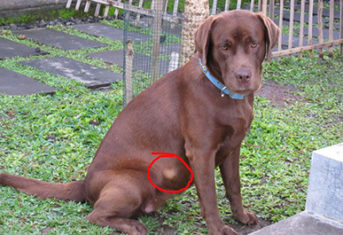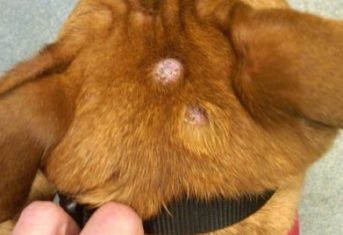Do Dogs Need Sunscreen? Protecting Your Dog from Solar-induced Tumors

Do Dogs Need Sunscreen? Protecting Your Dog from Solar-induced Tumors
Last week I saw a new patient with skin cancer. This dog’s tumor was a bit unusual for the dogs we see at the Animal Medical Center – this dog’s cancer was likely the result of sun exposure. I’ll explore this unusual topic in the blog post below.
Common Skin Cancers in Dogs
The most common tumor we see in the skin of dogs is a fatty tumor or lipoma. Some dogs have dozens of these tumors, and they are usually more unsightly than they are dangerous. On the other hand, mast cell tumors, the most common malignant skin tumor we see in dogs, can be quite deadly and requires surgical removal often followed by chemotherapy and radiation therapy. Neither of these tumors are caused by sun exposure. Both lipomas and mast cell tumors have a genetic component – some breeds are predisposed – but, beyond that, researchers have yet to find a single cause or predictive risk factor.
Solar-induced Cancer in Dogs
There are two types of solar-induced skin cancer in dogs: hemangiosarcoma and squamous cell carcinoma. Most hemangiosarcomas occur in the abdominal organs of dogs. Squamous cell carcinomas occur in the mouth, ear and toes of dogs. The solar-induced variety of these tumors often occurs in glabrous skin, meaning the sparsely-haired skin of the tummy, armpits and inguinal area (groin).
Dog Breeds at Risk for Solar-induced Cancer
Given these tumors’ predilection for sparsely-haired skin, you can likely guess that dogs with thin haircoats are at an increased risk. These breeds include Whippets, Italian Greyhounds, Dalmatians, Pit bulls, and Staffordshire bull terriers. These dogs also have white or light-colored coats in common. The new patient I saw fit this bill exactly: a Pit bull with a white coat. His owner reported that her pup likes to “sunbathe on his back.” Since the dog is a rescue, we don’t know the full history, but I suspect he might have been an outdoor dog prior to his rescue.
Is There Sunscreen for Dogs?
Once the owner understood the diagnosis, she asked if sunscreen would help her dog. I was stumped. I could not find any dog-specific products approved by the Food and Drug Administration’s Center for Veterinary Medicine (FDA-CVM), so I reached out to Anne Norris of the FDA-CVM. She replied via email, “To date, the FDA has not approved any New Animal Drug Applications for sunscreen/sunblock for pets. To know whether a pet sunscreen is classified as a drug or as a grooming aid, the FDA would need to assess them on a case-by-case basis. Depending on the ingredients in the product and the product claims, it could be regulated by the FDA as a drug. Otherwise, it would probably be considered a grooming aid, which we do not regulate (see the language on our website).”
When asked about using human sunscreen on dogs, she replied via email, “There are many different types of human sunscreen/sunblock products on the market that contain a variety of ingredients. Some dogs may have a sensitivity to the ingredients in these products or the products may contain ingredients that could be a safety concern in dogs either by absorption through the skin or ingestion by licking the application site. The FDA has not made any safety or effectiveness evaluations regarding the use of human sunscreen/sunblock products in dogs or cats. Please consult your veterinarian before using any sunscreen/sunblock product on your pet.”
So, the best and safest method of protecting your dog against solar-induced skin cancer is to keep your dog out of the sun. If that’s not possible, then consider a sun protection suit, but chose one that covers the glabrous skin.

































